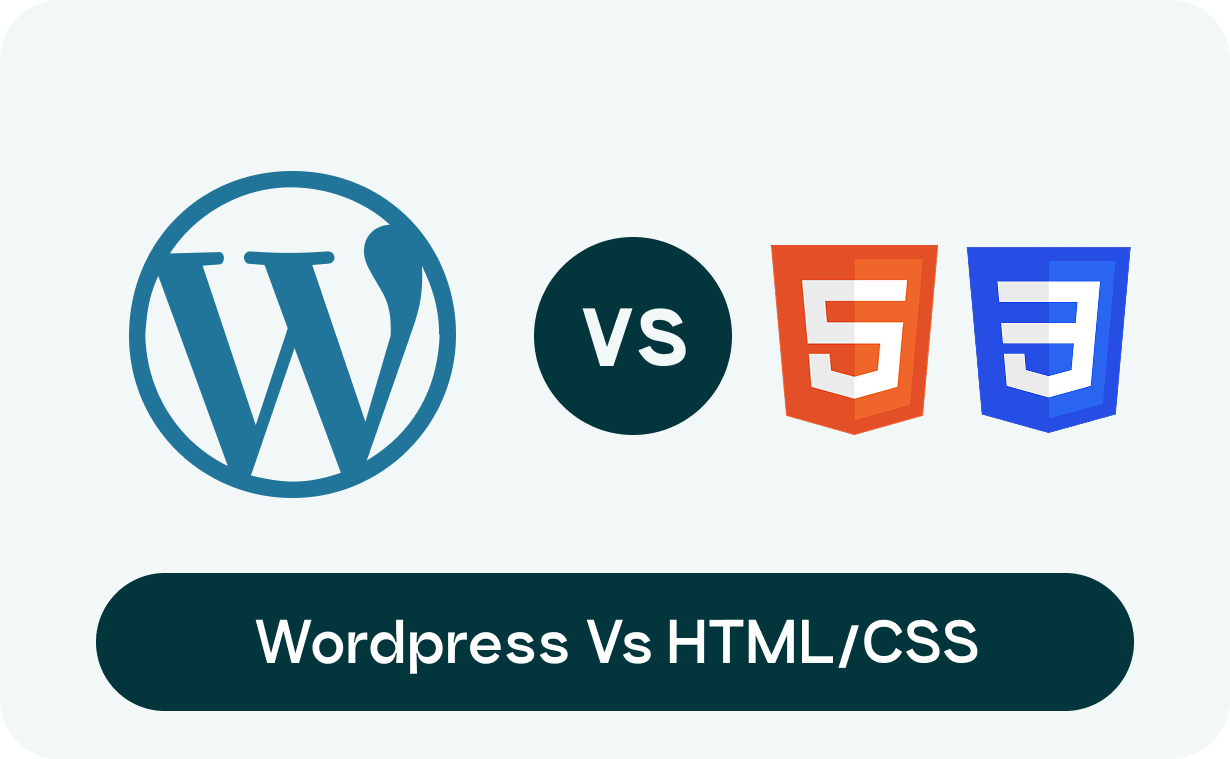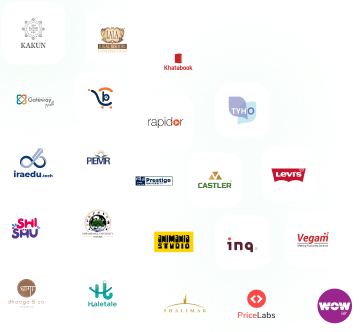Table Of Content
- Overview of WordPress
- Overview of HTML/CSS
- Feature Comparison Table of WordPress vs HTML/CSS
- Ease of Use - WordPress vs HTML/CSS
- Customization and Flexibility - WordPress vs HTML/CSS
- Performance - WordPress vs HTML/CSS
- SEO - WordPress vs HTML/CSS
- Pricing - WordPress vs HTML/CSS
- Conclusion: Which Should You Choose between WordPress vs HTML/CSS?
- FAQs: WordPress vs HTML/CSS
When deciding on the best approach for creating a website, WordPress vs HTML/CSS are two of the most common choices. However, they serve different purposes and are suitable for different kinds of websites. In this comparison, we'll explore both options to help you determine which is right for your project.
Overview of WordPress
WordPress is an open-source content management system (CMS) that enables users to create, manage, and modify websites easily without needing to code. WordPress is built using PHP and MySQL, and it comes with a wide variety of themes and plugins that make it easy to create fully functional websites.
Key Features of WordPress:
User-Friendly Interface: WordPress has a simple and intuitive dashboard that makes it easy for beginners to manage content.
Themes and Plugins: Thousands of pre-built themes and plugins are available to customize websites without needing coding skills.
Content Management: Designed for users who want to focus on content creation (blogs, articles, etc.).
SEO-Friendly: Built-in SEO features and additional plugins like Yoast SEO help optimize websites for search engines.
Scalability: Suitable for small blogs to large corporate websites.
Community Support: With a large global community, finding support and resources is easy.
Overview of HTML/CSS
HTML (Hypertext Markup Language) is the foundational language used to structure content on the web. CSS (Cascading Style Sheets) is used to style that content. Together, HTML and CSS give you complete control over how a website looks and functions. Unlike WordPress, HTML/CSS requires manual coding to build and maintain a website.
Key Features of HTML/CSS:
Complete Control: You have full control over the structure and design of your website.
No Dependency on External Tools: No need for plugins or themes; everything is built from scratch.
Fast Loading Times: A website built purely with HTML and CSS will usually load faster, as there are fewer dependencies.
Customization: Customization is limitless, but it requires significant knowledge of coding.
Static Websites: HTML/CSS is best for static websites that don’t require frequent updates or dynamic content.
Feature Comparison Table of WordPress vs HTML/CSS
| Feature | WordPress | HTML/CSS |
|---|---|---|
| Type | Content Management System (CMS) | Static Website Building (Markup & Styling) |
| Ease of Use | User-friendly (for non-tech users) | Requires coding knowledge (HTML, CSS) |
| Customization | High (via themes and plugins) | Full control (requires manual coding) |
| Performance | Can be slower with plugins | Fast, lightweight (minimal dependencies) |
| SEO | SEO-friendly (plugins available) | Must be manually optimized |
| Security | Vulnerable to plugins & themes | Can be more secure if coded properly |
| Learning Curve | Low (easy to start) | High (requires coding expertise) |
| Best For | Blogs, eCommerce, dynamic sites | Static sites, portfolios, landing pages |
| Pricing | Free (with hosting costs) | Free (but requires hosting) |
| Backend Handling | Built-in (via plugins) | Needs external tools or coding |
Ease of Use - WordPress vs HTML/CSS
WordPress:
WordPress is a beginner-friendly platform designed for people with little to no technical knowledge. The dashboard is intuitive, and users can create and manage content with minimal effort. Adding new pages, blog posts, and images is as simple as clicking a button. The use of pre-designed themes and drag-and-drop builders further simplifies the process.
Pros:
No need for coding skills
Pre-built themes and plugins for easy customization
Easy to update and manage content
Cons:
Requires time to learn the plugin ecosystem
May face performance issues if too many plugins are installed
HTML/CSS:
HTML and CSS require you to manually code each page and design element of your website. While this provides full control over the structure and design, it requires knowledge of web development technologies. There are no drag-and-drop options in HTML/CSS, making it unsuitable for beginners without coding experience.
Pros:
Full control over the website’s code
No reliance on external tools like plugins
Ideal for static websites with a fixed structure
Cons:
Requires coding knowledge (HTML, CSS, JavaScript)
Harder to make updates and add dynamic content
Winner: WordPress (for ease of use)
Customization and Flexibility - WordPress vs HTML/CSS
WordPress:
WordPress is extremely customizable, with thousands of themes and plugins that can modify everything from the site layout to the functionality. However, while you can achieve a lot of customization without code, some advanced features may require technical knowledge or custom coding.
Pros:
Thousands of themes and plugins available
Easy customization with minimal coding
Cons:
May require paid themes or plugins for advanced functionality
Customizations may be limited depending on the theme or plugin used
HTML/CSS:
HTML/CSS offers complete freedom in design and layout, allowing you to create a fully customized website. There are no restrictions like in WordPress, where plugins and themes might dictate certain elements. However, since customization requires manual coding, it can be time-consuming and technically challenging.
Pros:
Unlimited design possibilities
Full control over all aspects of the website
Cons:
Customization requires coding and web development skills
Takes longer to build complex sites
Winner: HTML/CSS (for full customization)
Performance - WordPress vs HTML/CSS
WordPress:
WordPress websites are relatively slower due to the heavy reliance on plugins, themes, and dynamic content generation. While plugins can enhance performance (like caching tools), WordPress may still experience lag, especially if you have a lot of content or plugins.
Pros:
Performance can be optimized with caching and CDN
Cons:
Can be slower with many plugins or complex designs
HTML/CSS:
Since HTML/CSS websites are static, they typically load faster than WordPress sites. There are no extra dependencies or database queries, which contributes to better performance. A simple static HTML page can load almost instantly.
Pros:
Fast loading times with minimal resources
Cons:
Static pages, no dynamic content or features
Winner: HTML/CSS (for speed)
SEO - WordPress vs HTML/CSS
WordPress:
WordPress is SEO-friendly right out of the box, with plugins like Yoast SEO and All in One SEO that make it easy to optimize meta titles, descriptions, and URL structures. WordPress also allows easy integration with social media, sitemaps, and other SEO tools.
Pros:
SEO-friendly plugins for easy optimization
Built-in tools for improving SEO
Cons:
Dependent on plugins for full SEO capabilities
HTML/CSS:
HTML/CSS websites give you complete control over SEO elements such as meta tags, headers, and image alt texts. However, this means you need to manually optimize the website for SEO, which can be more time-consuming than using WordPress plugins.
Pros:
Full control over on-page SEO
No reliance on plugins for SEO
Cons:
Requires manual SEO setup
No built-in tools for advanced SEO features
Winner: WordPress (for ease of SEO management)
Pricing - WordPress vs HTML/CSS
WordPress:
WordPress itself is free to use, but you'll need to pay for hosting, a domain name, and any premium themes or plugins. Pricing can vary based on your hosting provider and the features you require.
Pros:
Free software
Affordable hosting options available
Cons:
Can incur extra costs for premium themes and plugins
HTML/CSS:
HTML/CSS is free to use, and you only need to pay for hosting and a domain name. There are no recurring fees for themes or plugins, making it a cost-effective option for simple websites.
Pros:
Free software
Lower ongoing costs
Cons:
Costs for hosting and domain names
Need for external development resources if you don't code
Winner: HTML/CSS (for cost-effectiveness)
Conclusion: Which Should You Choose between WordPress vs HTML/CSS?
| Criteria | Best Choice |
|---|---|
| Ease of Use | WordPress |
| Customization | HTML/CSS |
| Performance | HTML/CSS |
| SEO | WordPress |
| Cost | HTML/CSS |
| Scalability | WordPress |
Final Verdict on WordPress vs HTML/CSS
Choose WordPress if you want an easy-to-use platform with a lot of features and themes, especially for dynamic websites, blogs, or eCommerce sites. It’s great for users who want to focus on content without needing to code. Get in touch
Choose HTML/CSS if you need a simple, static website or have the skills to code a fully custom site. It’s ideal for portfolios, landing pages, or websites that don't require frequent updates.
FAQs: WordPress vs HTML/CSS
1. Can I use HTML/CSS for dynamic content?
HTML/CSS is best for static websites, but with the addition of JavaScript, you can create dynamic content.
2. Is WordPress secure?
WordPress security depends on plugins, themes, and updates. Regular maintenance can help keep your site secure.
3. Which is better for SEO: WordPress or HTML/CSS?
WordPress offers built-in SEO tools that make optimization easier, while HTML/CSS gives you more control but requires manual optimization.
By evaluating your needs—whether you want an easy-to-manage site or a fully custom-built site—you can make the right decision between WordPress and HTML/CSS for your project.
Follow us on Facebook to know more about us.
The world’s First zero commission platform
Hire tech partners effortlessly
 If you're a non-tech founder looking for an agency or a tech founder looking for engineers.
If you're a non-tech founder looking for an agency or a tech founder looking for engineers. You can get your 5 best matches from 2800 in 5 mins, with 1000 data points tracked.
You can get your 5 best matches from 2800 in 5 mins, with 1000 data points tracked. Connect directly with no credit card needed!
Connect directly with no credit card needed!
You’re just a click away from the best talent.


